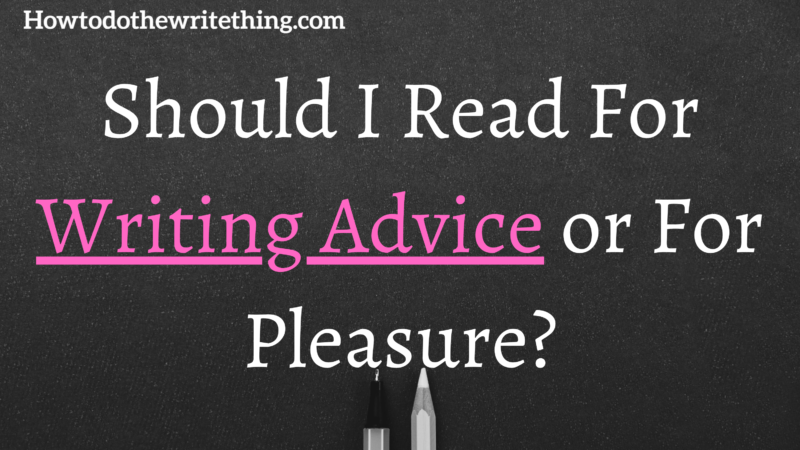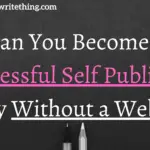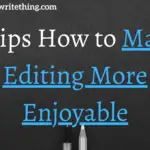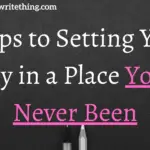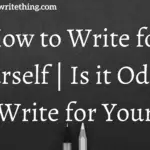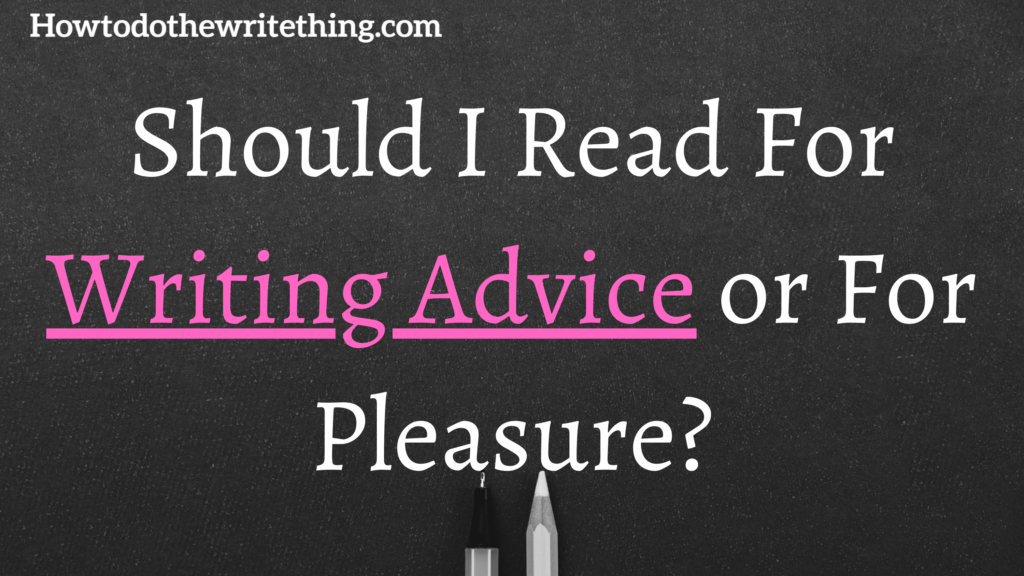
Should I Read For Writing Advice or For Pleasure?
Reading for analysis and advice is somewhat distant from reading for just pleasure, but at the same time reading for pleasure is very helpful for writers, but maybe not for the reasons you’re thinking.
When you’re enjoying a book you can just read through several chapters and look at the time to see hours have disappeared and suddenly realize you forgot to eat all day.
When we read a story to study the authors writing style and intent we stop to think about commas, plot, character development, and all sorts of other things.
So the question is as an aspiring writer should we read for pleasure at all or just read for advice?
Half and half.
It should really be a healthy blending of the two. We should read some things just to enjoy them and when we do enjoy them we should go back and study them to see the nuts and bolts of why we really enjoyed them. As writers, it’s a great skill if we are able to put ourselves back into the minds of just being a reader.
If we forget what that is like to get lost in a good book that can become a detriment to our awareness of what it is like to just consume a story and enjoy it for its writing merit.
On the other hand, it’s important to be able to break down a scene and understand how to set up a good cliffhanger or know how to show what our character is feeling without just saying it.
Remember your first good read.
Can you remember the first time you read through a book and just couldn’t put it down? Do you remember reading through a book in one sitting?
I do. It was Stuart Little (I didn’t read this one in one sitting, but I remember it being the first book I couldn’t put down.) I wasn’t an avid reader (which might surprise you) in fact, I hated reading for a long portion of my life. Having ADD, just meant I couldn’t focus on a book. I would literally read the words and then wake up from zoning out to only realize I was halfway down the page and didn’t know anything I just “read.”
After rereading the same paragraph 4 or 5 times I would inevitably give up.
One day, my brother mentioned that I should try Stuart Little. So I did.
I remember little of the next 3 days except reading that book and imagining a little sophisticated mouse shooting arrows at a cat.
It’s good to have moments like this, especially if we write. We want to know and remember what it is like to just find a good book and what it is like to get lost in it.
We should be striving for that in our writing. We want our readers to get lost in a good story.
It’s hard to stop.
Once we start to analyze writing for the study of our own writing style it is EXTREMELY difficult to go back and just read for pleasure
It’s hard to just read for pleasure, but it is possible. Sometimes I’ll even find myself trying to analyze an author and suddenly I’ll realize I’m just reading again and will have missed some good analysis 😂
So it can really go both ways depending on who you are reading.
But I often find myself dissecting stories and writing on any media I’m enjoying. It’s hard to watch a show without analyzing the script, the plot, and the acting.
It doesn’t bother me. I enjoy analyzing, but I know for some writers they miss being able to just enjoy a good story without thinking too deeply into it.
So take caution. When you start to read for analysis, just know that it’ll be difficult to just read for fun.
Try to remember your spark.
Most aspiring writers love reading and writing. There are a few writers that just love writing and have to force themselves to read, but I don’t think this is the norm.
For those that start to read to study writing try to have something in place that can trigger your ability to remember what it is like just to be a reader and not a writer.
You don’t really want to write like a writer unless you are writing to writers. (Say that five times fast.)
You really want to write remembering what it is like to be a reader that gets lost in a good book.
With that type of thinking try to think of some of the books you personally got lost in.
Take time to remember what that was like. When you read most of the time you want to keep an analytic eye on what you’re reading.
But don’t forget what it is like to read a book for enjoyment.
How would you write it?
One fun and helpful way of reading is to read with an editor’s eye.
What would you change about it?
I’ll do this from time to time and it’s very helpful for my growth as a writer.
It doesn’t have to be that we think we are “better” and can make the writing better. It has more to do with our personal writing style.
When you can see how you would say something just a little bit differently than another writer, you start to see how you ARE different from that writer.
This is important and helpful for having your own voice.
Want to get paid to write? Check out Writing Paychecks
- There is a simple method over 30,000 people use to get paid for freelance writing online.
- Opportunities can get started in just minutes a day, all from your home couch.
- It’s easy to get started! No previous experience or degree required to start.
- Exclusive job listings for writers, updated daily.
Check out Writing Paychecks to see if you can start getting paid to write today.

The change might be hard.
If you are an avid reader already it will be hard to put on analytical goggles. You’ll have to work at it and create a new skill.
If you’re an analytical person already, you know it’s hard to turn off and you probably analyze everything, not just writing.
Whichever you are the change will be hard for you.
It’ll either be hard to stop just reading for pleasure and start to analyze and break down other author’s writing so you can learn and figure out your own style of writing.
Once you become analytical about your reading it can be difficult for some time to turn it off and try to read for fun without automatically seeing blatant errors or how the writing could be better, in your opinion.
Take a deeper look.
After you’ve become analytical about your reading and media you’ll start to have key moments to be on the lookout for.
You’ll be reading a book and suddenly you’ll realize you were drawn in without trying to analyze or critique. It was a part of the writing you were really into and you naturally got drawn in.
When you see this happen and you realize it you should try to stop and go back and analyze that section.
What happened?
What did the author do that drew you in and made you forget you were reading?
These moments become really key in our experience as writers. Seeing the moment we get drawn in is one of the best ways to learn how to draw readers in ourselves.
Take notes.
Reading is a good time to have a journal or pen nearby.
You can jot things that stick out to you right into the margins of the book (I personally don’t like to do this. Feels like I’m making a mess in the book.)
Or you can jot things down in a journal or your smartphone.
When we take time to write down what we just noticed we are solidifying that realization in our memory.
This is an extremely helpful practice, but it does take work and it’s not very fun at first. It’ll seem more fun later when you go to write and you realize that your memory retention is getting better.
Write out your inspiration.
Another great thing we can do while we are reading is to be on the lookout for inspiring ideas.
Maybe we are watching a show and something that is said or done brings a new idea to your mind for one of your characters. Do not wait.
Pause what you are watching if you can and go write down a quick outline or short story and your new idea so you don’t lose it.
If you wait, it is likely that you won’t be able to recall it later or you will just forget to write it down altogether.
Enjoying Should I Read For Writing Advice or For Pleasure? Take a moment and consider sharing this social-friendly image to say thanks and feel free to comment with your thoughts below! 🙂
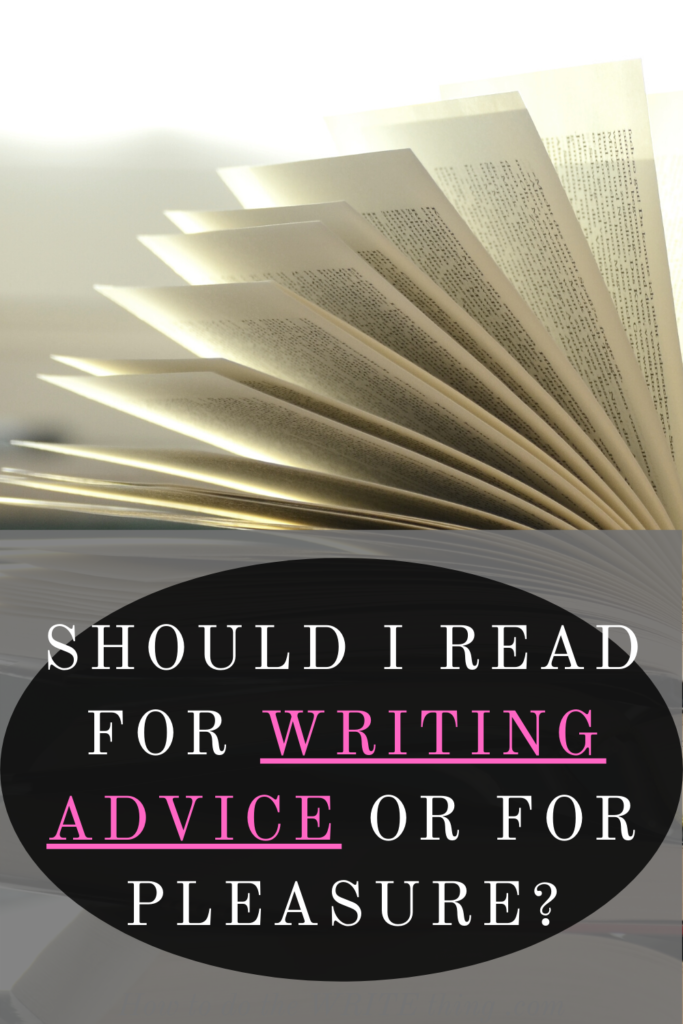

Want to get paid to write? Check out Writing Paychecks
- There is a simple method over 30,000 people use to get paid for freelance writing online.
- Opportunities can get started in just minutes a day, all from your home couch.
- It’s easy to get started! No previous experience or degree required to start.
- Exclusive job listings for writers, updated daily.
Check out Writing Paychecks to see if you can start getting paid to write today.



That’s all for now.
Hope this helps!
Happy writing!
Other Resources You Might Enjoy:
How to Start a Blog in 11 Simple Easy Steps in 2020
How to Write a Book: 32 Tips | Your MASSIVE Guide How to Write a Book
Interested in starting a blog of your own? Check out Bluehost.
Check out these FREE trial resources from Amazon for when you work from home (or are stuck at home 🙂 ) As an Amazon associate, if you do sign up or buy anything using Amazon links from our site we make a commission at no extra cost to you.
Free Prime Membership Trial:
Try Amazon Prime 30-Day Free Trial
Try Prime Discounted (Free Trial)
Get Unlimited Music for Free (30-day free trial):
Free Baby Registry:
Shop Amazon – Create an Amazon Baby Registry
Make your Free Amazon Wedding Registry:
Create an Amazon Wedding Registry
Make sure your posts are readable. Use this readability score check
Want to check out a writer’s community to test your writing and get feedback?
Enjoying Should I Read For Writing Advice or For Pleasure? Take a moment and consider sharing this social-friendly image to say thanks and feel free to comment with your thoughts below! 🙂
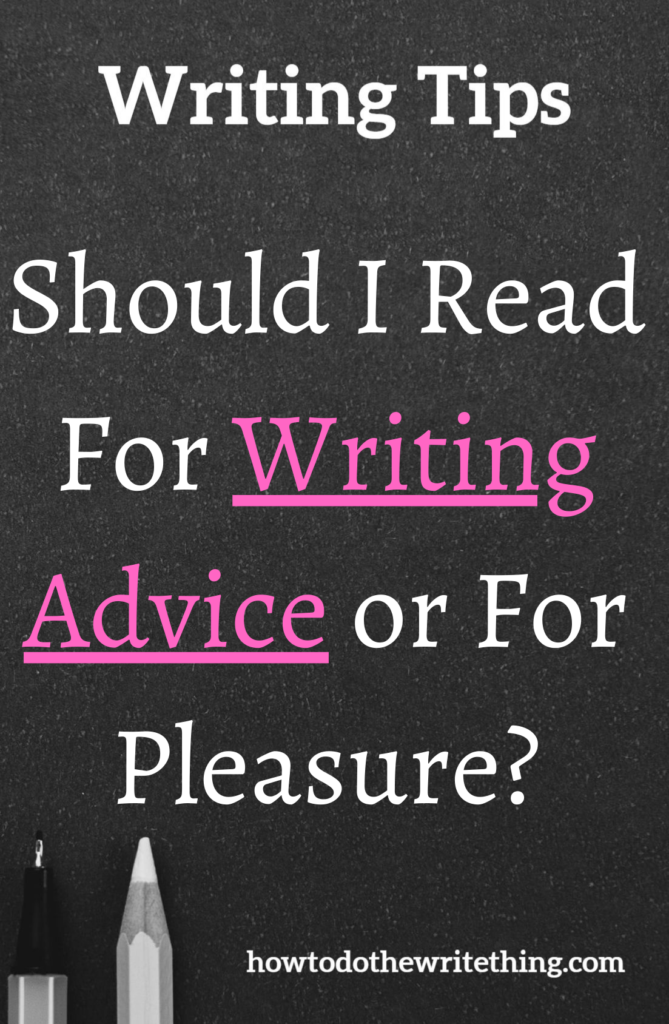

We hope you enjoyed: Should I Read For Writing Advice or For Pleasure?
